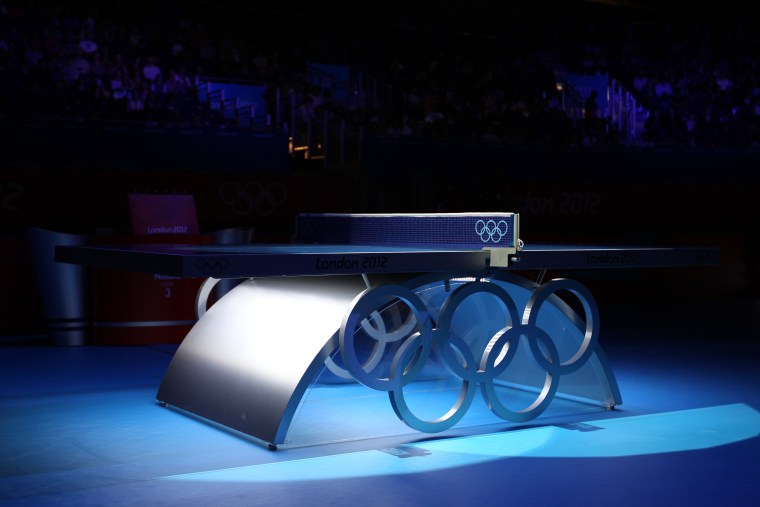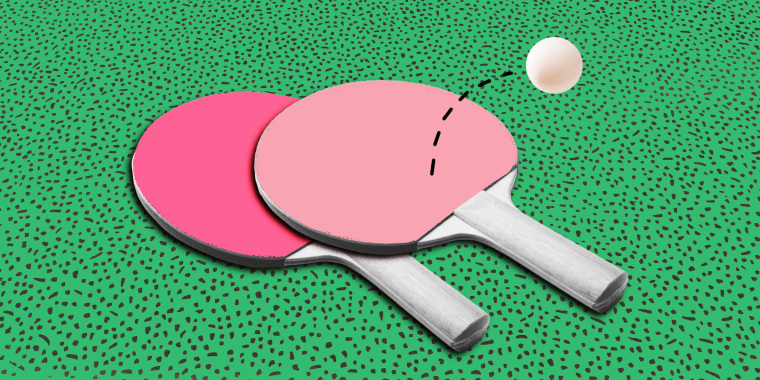It’s time to settle this once and for all. That game you play in your basement — is it called ping-pong or table tennis? What are the real rules? How do you keep score? Is “sucker’s serve” only for suckers?
All these questions and more may come up as competition begins at the 2021 Tokyo Olympics, still officially called the 2020 Tokyo Olympic Games. American Kanak Jha, now 21, is heading to his second Olympics and looking to medal.
We've answered your most-googled questions in TODAY’s ultimate guide to the ultimate Olympic sport: ping-pong! Or is it table tennis? Let’s find out.
Is table tennis the same as ping-pong?
Ping-pong and table tennis seem to get used interchangeably. Are they the same game with the same rules? Is one better than the other? Will calling it “ping-pong” in front of a group of professional players lead to horrified gasps and you being politely escorted out of the building?
To understand why the game has two names, we should first understand the origins of the sport.
Given that ping-pong is so popular in Asia, many people think it originated there. However, ping-pong was actually invented in London. Near the end of the 19th century, the Victorian game of Lawn Tennis (what we now know as tennis) was becoming quite popular across Great Britain. Ping-pong evolved as a way to keep the rally going during the winter months without having to go outside.
The game was a hit, so lots of companies began selling the paddles, balls, nets, and tables required to play the game. Each of these companies called it something different. The International Table Tennis Federation (ITTF) lists all of the following as former names of the sport:
Gossima, Whiff Whaff, Parlour Tennis, Indoor Tennis, Pom-Pom, Pim-Pim, Clip-Clap, Netto, The Royal Game, Tennis de Salon, Ping Pong, Table Tennis.
Only the last two stuck, which explains why no one knows what I’m referring to when I ask if anyone would like to spar in a bout of “The Royal Game.”
One of these British manufacturers, Jaques & Sons, trademarked their onomatopoetic name — “Ping-Pong.” The trademark was so heavily enforced that it led to two different professional associations for the same sport: The Ping-Pong Association and its rival, the Table Tennis Association. In 1926, these two organizations combined to form the International Table Tennis Federation, which continues to organize all professional tournaments around the world.
So, the official name of the professional sport is table tennis. But, ping-pong is still used colloquially. Complicating matters is the fact that the Chinese translation of table tennis is “ping-pang.”
It comes down to a difference in connotation. While the games are the same, playing ping-pong is like playing football with your family on Thanksgiving, while playing Table Tennis is like playing in the NFL. Thus, if you want to be taken seriously as a racket sport athlete (and are willing to risk your friends making fun of you) call it table tennis.
Is ping-pong an Olympic sport?
Yes, table tennis became an Olympic sport in 1988 with its debut at the Games in Seoul, South Korea. Table tennis player Yoo Nam Kyu won the first ever gold medal for his home country.
Of the 32 gold medals awarded at the Olympics for table tennis through 2016, China has won 28.
The reigning Olympic champion is Ma Long of China. He is a three-time Olympic gold medalist. He will compete in the 2021 Games in Tokyo where he has the opportunity to become the most decorated Olympic Table Tennis player of all the time. He is indisputably one of the best (if not the best) player of all time, earning him the nickname: "The Dragon."
Olympic Table Tennis begins at the Tokyo Summer Games on July 24 (with the time difference, that's July 23 in the United States) and continues through Aug. 6, 2021.
Why do professional players stand so far back from the table?
The most common association people have with professional table tennis is that the players stand very far back from the table. This is true, and very exciting to watch.
However, it’s a misconception that “the better you are, the further back from the table you stand.” In a professional setting, when a player is far away from the table during a rally, that means they are on the defensive. It’s not where you want to be! Much like playing at the net in regular tennis, standing closer to the table is the more offensive, more dominant stance to take.

Is professional table tennis equipment the same as what you have in your basement?
Like any sport, professional table tennis equipment is leagues above the standard recreational fare. It can also get quite expensive! The most elite paddles sell for hundreds of dollars. The biggest difference in the paddles is that professional ones have a layer of thick, sticky, smooth rubber on either side (compared to very thin, often bumpy piece of rubbery plastic that you find on most basement paddles). The rubber surface allows the players to maximize the amount of spin they put on the ball. This reflects the biggest difference between professional and recreational table tennis: It’s not the speed. It’s the spin.
Table tennis athletes also wear special shoes with a unique, rubberized grip underneath the shoe. This prevents slipping and ankle injuries when performing the quick directional changes necessary for high-level competitive play.
If you have a kid at home who loves to play ping-pong, some high-level table tennis equipment makes for a great gift: Butterfly is a great brand for all things Table Tennis.

Is it called a racket or a paddle?
This one is a little easier to clear up. It's a paddle. A piece of sporting equipment is only a racket (or racquet) if it has strings (i.e. tennis, badminton, squash, etc...). However, if you really want to talk like a Table Tennis pro, you can call it a "bat."
What is a ping-pong ball made of?
Table Tennis balls used to be made of a celluloid material. As of January 2014, the ITTF officially made the switch to a plastic compound. They have extremely strict requirements about the kind of plastic, the size, and the roundness of the ball. If you want to play Olympic-style Table Tennis at home, make sure the balls you buy say "ITTF Approved."
What are the rules of table tennis? How is it scored?
Now that you know the name of the game, let's talk about how to win!
A professional or Olympic table tennis match is played in games to 11 (not 21!). Much like how a tennis match is a best of 5 sets, a table tennis match will be a best of 7 of these games to 11. Service alternates 2 serves each (not 5!). If the score reaches 10-10, this is a deuce. In deuce, service alternates 1 serve each until someone has a two point lead. This type of scoring is known simply as “win by 2.”
“Sucker’s Serve," common in recreational games — in which the player on the verge of losing a game gets to serve as many times as they want — does not exist in professional table tennis. If you want your home match to count as regulation, this should be eliminated from your ping-pong rulebook.
When playing doubles, the rules are all the same except for the fact that team members must alternate who hits the ball, switching off every shot.
Can you touch the table in ping-pong?
Another important rule in Table Tennis is that it is illegal to touch the table. If you touch the table surface with your free hand (the one that’s not holding a paddle, or with any part of your body), your opponent gets the point automatically. It is also illegal to move the table during a point.
Now that you know the history of the game and more of the rules, practice up in time for The Tokyo Olympics! To see how it’s really done, I can’t recommend watching Olympic Table Tennis enough – it’s absolutely thrilling! Tune in to NBC’s Olympics coverage this summer, beginning July 2021.
